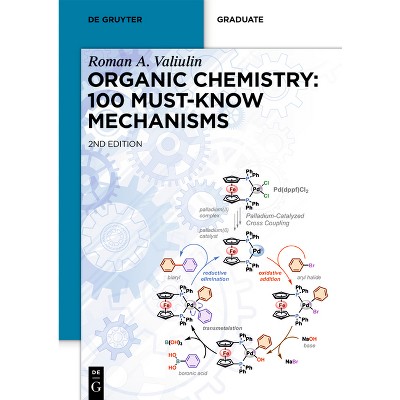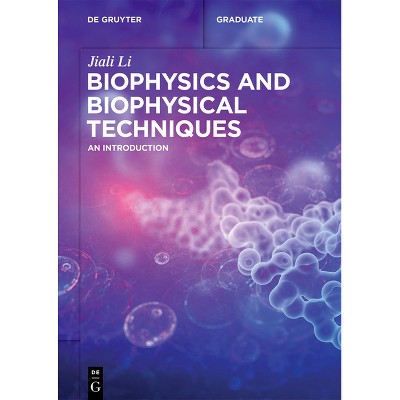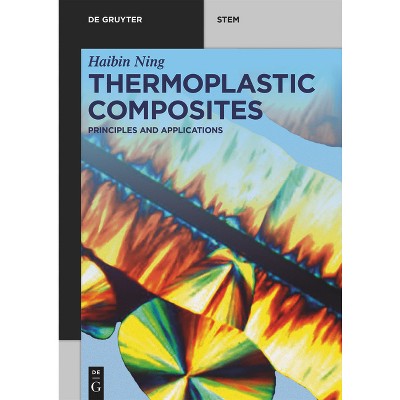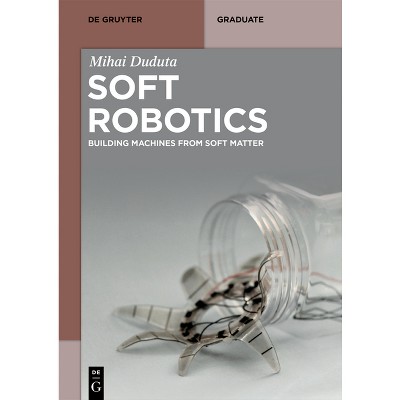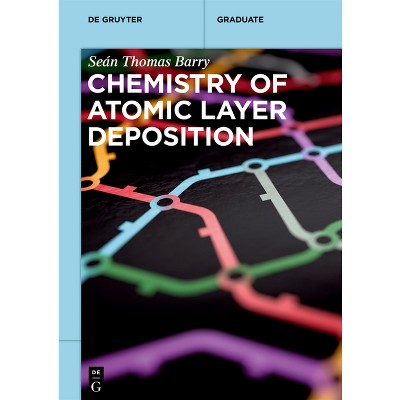Mechanisms of Self-Healing Polymers - (De Gruyter Stem) by Abhijit Bandyopadhyay & Poulomi Dasgupta & Sayan Basak (Paperback)

$100.99 when purchased online
Target Online store #3991
About this item
Highlights
- Self-healing synthetic materials have the ability to repair damage on their own, restoring functionality and significantly extending the lifespan, energy efficiency, safety, and environmental impact of synthetic materials.
- About the Author: Abhijit Bandyopadhyay is currently serving as a full Professor in the Department of Polymer Science and Technology at the University of Calcutta and holds the position of Technical Director at South Asia Rubber and Polymers Park (SARPOL) in West Bengal.
- 219 Pages
- Technology, Materials Science
- Series Name: de Gruyter Stem
Description
About the Book
Self-healing synthetic materials have the ability to repair damage on their own, restoring functionality and significantly extending the lifespan, energy efficiency, safety and environmental impact of synthetic materials. The book encompasses a specBook Synopsis
Self-healing synthetic materials have the ability to repair damage on their own, restoring functionality and significantly extending the lifespan, energy efficiency, safety, and environmental impact of synthetic materials. These materials can mimic self-repair mechanisms in biological materials and regain their original functionalities, ensuring prolonged durability. Methods for repairing mechanically damaged polymeric materials include using photo-activated healing agents, reversible covalent bonds, cycloaddition reactions, metal-ligand complexes, and dynamic non-covalent bonding. The initial chapter of the book lays the introduction by offering a fundamental overview of self-healing materials. It encompasses a spectrum of smart materials, from self-healing polymers to self-healing ceramics. The next section introduces the mechanisms that endow these materials with their remarkable properties. It explores various self-healing strategies, underlying chemistries, and stimulus responsiveness crucial for achieving these self-repairing abilities. The book then focuses on the processing aspect of these materials, detailing diverse fabrication methods used for developing these intelligent polymers, both in laboratory settings and at an industrial scale. The next section centers on self-healing elastomers, encompassing thermoplastic elastomers and thermoplastic vulcanizates. It not only provides an overview but delves into the synthesis, structure-property relationships, and applications of these elastomers molded as self-healing materials. The book concludes with potential applications of these smart materials. It is structured around specific properties such as mechanical or rheological characteristics, showcasing how these traits inspire the practical application of self-healing elastomers.About the Author
Abhijit Bandyopadhyay is currently serving as a full Professor in the Department of Polymer Science and Technology at the University of Calcutta and holds the position of Technical Director at South Asia Rubber and Polymers Park (SARPOL) in West Bengal. He completed his B.Sc. in Chemistry (Honors) from the University of Calcutta with first-class honors in 1997. Following this, he obtained his B.Tech. and M.Tech. in Polymer Science and Technology, both from the University of Calcutta, in 2000 and 2002, respectively, graduating with first-class distinctions. Subsequently, in 2005, he completed his Ph.D. in Polymer Nanocomposites from the Rubber Technology Centre, IIT Kharagpur. Prior to joining the University of Calcutta in November 2008, Dr. Bandyopadhyay served as an Assistant Professor at the Rubber Technology Centre, IIT Kharagpur from 2007 to 2008. His academic contributions include the publication of 90 papers in high-impact international journals, authoring three books, and filing two Indian patents. He has managed numerous funded research projects and provided consultancy services to esteemed companies such as Exide Industries Ltd., and Philips Carbon Black Ltd. He is a Fellow of the International Congress for Environmental Research since 2010, an Associate Member of the Indian Institute of Chemical Engineers, and a Life Member of the Society for Polymer Science, Kolkata Chapter, and the Indian Rubber Institute. Dr. Bandyopadhyay serves as an Editorial Board Member for two international journals. With over 12 years of teaching and research experience, he has received accolades such as the Young Scientist Award by the Materials Research Society of India, Kolkata Chapter in 2005, and the Career Award for Young Teachers by the All India Council for Technical Education, Government of India, in 2010. His research interests encompass various areas including polymer nanocomposites, reactive blending, adhesion, polymer hydrogel in drug delivery, waste-polymer composites, green polymer composites, and hyperbranched polymers. He has successfully supervised 11 research students for their doctorate degrees and is currently guiding 4 more.Poulomi Dasgupta graduated with a Chemistry (Honors) degree from Vidyasagar College (Kolkata) in 2013. She later obtained her B.Tech. in 2016 and M.Tech. in 2019 from the Department of Polymer Science and Technology at the University of Calcutta. Notably, she was awarded a gold medal from the University of Calcutta during her B.Tech. Her research primarily focused on the Development of thermo- responsive self-healable elastomeric compound and its characterization.
Sayan Basak completed his B.Tech. in Polymer Science and Technology at the University of Calcutta (2015-2019) and earned his Ph.D. from the University of Akron (2019-2023), specializing in smart polymers. His research focused on shape memory and functional elastomers, aligning with his undergraduate studies. Currently, he works as a research investigator at Biocon India, contributing to the chemical development team. His transition from academia to industry reflects his commitment to applying polymer science knowledge in real-world settings.
Dimensions (Overall): 9.61 Inches (H) x 6.69 Inches (W) x .43 Inches (D)
Weight: .73 Pounds
Suggested Age: 22 Years and Up
Number of Pages: 219
Genre: Technology
Sub-Genre: Materials Science
Series Title: De Gruyter Stem
Publisher: De Gruyter
Theme: General
Format: Paperback
Author: Abhijit Bandyopadhyay & Poulomi Dasgupta & Sayan Basak
Language: English
Street Date: December 1, 2025
TCIN: 1004472222
UPC: 9783111583099
Item Number (DPCI): 247-42-5387
Origin: Made in the USA or Imported
If the item details aren’t accurate or complete, we want to know about it.
Shipping details
Estimated ship dimensions: 0.43 inches length x 6.69 inches width x 9.61 inches height
Estimated ship weight: 0.73 pounds
We regret that this item cannot be shipped to PO Boxes.
This item cannot be shipped to the following locations: American Samoa (see also separate entry under AS), Guam (see also separate entry under GU), Northern Mariana Islands, Puerto Rico (see also separate entry under PR), United States Minor Outlying Islands, Virgin Islands, U.S., APO/FPO
Return details
This item can be returned to any Target store or Target.com.
This item must be returned within 90 days of the date it was purchased in store, shipped, delivered by a Shipt shopper, or made ready for pickup.
See the return policy for complete information.
Trending Book Pre-Orders

Highly rated
$10.19 - $23.09
MSRP $15.99 - $32.99
Buy 2, get 1 free select books, movies, music & Funko
4.6 out of 5 stars with 71 ratings

$16.00
Buy 2, get 1 free select books, movies, music & Funko
5 out of 5 stars with 1 ratings

$17.83 - $19.99
MSRP $19.99 - $30.00
Buy 2, get 1 free select books, movies, music & Funko
4.8 out of 5 stars with 4 ratings

$16.78 - $17.99
MSRP $18.99 - $27.99
Buy 2, get 1 free select books, movies, music & Funko
4.9 out of 5 stars with 7 ratings

$9.99 - $15.19
MSRP $9.99 - $18.99
Buy 2, get 1 free select books, movies, music & Funko
4.6 out of 5 stars with 5 ratings

$18.99 - $20.99
MSRP $19.00 - $29.99
Buy 2, get 1 free select books, movies, music & Funko
5 out of 5 stars with 1 ratings
